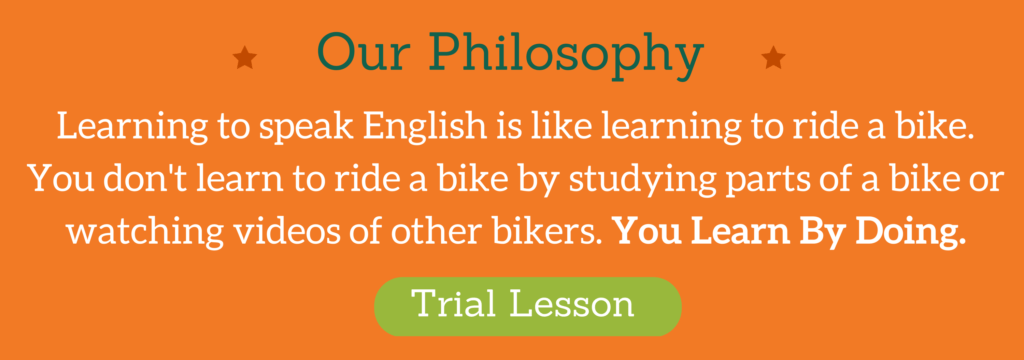6 Advanced Grammar Rules To Improve Your English Speaking
English is known for its crazy grammar rules. Although they might seem intimidating at first, learning these rules is crucial for improving your English speaking, and communicating properly or fluently. The purpose of the grammar rules is to give the English language some sort of structure. Without it, communicating and getting your message across would be much more difficult. This is why grammar is so important!
Clauses
Every sentence in the English language is made up of at least one clause. A clause is a group of words with a subject and a verb. (Remember, a subject is a noun doing an action and a verb is the action). An example of a clause would be: “The dog (subject) chased (verb) the rabbit.” A sentence is not complete unless it has at least one clause. This sentence would not make sense without a complete clause: “The dog (subject) the rabbit.” This sounds strange and does not convey a full message.
To really improve your English speaking, make sure that your sentences have at least one clause (one subject, and one verb) so you can more accurately express what you are trying to say.
Independent Clauses
An independent clause is a clause that can stand on its own. In other words, it is a complete sentence. This type of clauses is called “independent” because it does not need to rely on any other sentences or clauses in order to make sense. It expresses a full idea or concept by itself. The previous sample from above is an excellent example of an independent clause and full sentence: “The dog (subject) chased (verb) the rabbit.” There is a subject, verb, and a complete thought expressed.
Dependent Clauses
The other kind of clause is called a dependent clause. This clause still has a subject and a verb, but cannot stand on its own. It does not express a full idea and needs to rely on another clause in order to make sense. An example of a dependent clause would be: “When he (subject) felt (verb) adventurous.” There is a subject and a verb, but there is missing information. It isn’t a complete sentence. What happened when he felt adventurous? The keyword is “when” which is telling us there is more information that needs to be given.
To fix this, we have to combine the dependent clause with an independent clause so everything fits together: “When he felt adventurous (dependent), the dog chased the rabbit (independent).”
Now the dependent clause makes sense, and also adds more information to the sentence as a whole. Knowing what is considered a full sentence versus an incomplete sentence will help you when speaking in English. It also gives you a way to combine multiple ideas and make more complicated sentences, which can help you improve your English speaking and take it to the next level!
Improve your English Speaking – Practice with a Native English Teacher
Misplaced Modifiers
A modifier is a word, phrase, or clause that adds extra information to a sentence. An example would be: “She ran away (main sentence), completely embarrassed (modifier).
Modifiers are a great way to improve your English speaking and create more complex sentences and descriptions. However, there is also some things to be aware of when using modifiers. Many people, including native English speakers, will sometimes use misplaced modifiers. This is when a modifier is placed awkwardly in a sentence and can confuse or change the intended meaning, such as this example: “Floating down the river, a couple saw an abandoned row boat.”
In this sentence, “floating down the river” is in the wrong place. It sounds as though the people are floating down the river when really the row boat is floating. A better version of this sentence would be “The couple saw an abandoned row boat floating down the river.” Now we know that it was the boat floating, not the couple.
When speaking English and using modifiers, make sure that they are in a logical place so your ideas do not confuse yourself or your speaking partner. Doing so will greatly improve your English speaking.
Understanding When To Use “I”
One concept that causes trouble for even the most advanced English student is “I” versus “me.” “I” is a subject pronoun. This means it is always used when referring to a subject. For example: “I (subject) went to the pool.”
One way to remember when to use “I” is that it is almost always at the beginning of a sentence, where the subject belongs. It is also almost always in front of a verb. Remembering these rules will help you improve your English speaking. Here are some more examples:
“I (subject) love (verb) seafood restaurants.”
When referring to yourself as a subject- as the person doing an action- use the pronoun “I.” This includes when there are multiple subjects, as well, such as this example: “Tiffany and I (subject) went to the store.” However, many English speakers get mixed up and may say something along the lines of “They threw a surprise party for my sister and I” which is not correct. Here, you and your sister are not the main subject. In this sentence, “They” is the subject and the sentence should read “They threw a surprise party for my sister and me.”
Understanding When To Use “Me”
“Me” is different because it is not a subject pronoun. Instead, it is considered an object (or receiver) in a sentence. Here is an example: “My math teacher gave an award to me (object).”
The idea of subjects and objects may sound scary at first, but here are some tips to help you remember when to use “me” and improve your English speaking. “Me” is never the very first word in a sentence. Using “me” as a subject pronoun is considered grammatically incorrect. “Me love seafood restaurants” is wrong. Also, “me” almost always comes after a preposition (to, for, from, etc.) This is because the person is receiving something. Examples of this include:
“I (subject) decided that getting junk food wasn’t good for (preposition) me.”
“I (subject) couldn’t believe that Tyler gave a love letter to (preposition) both Katie and me.”
See where “I” is usually located versus “me”? Once it is broken down like this, the concept is so intimidating!
Are you currently trying to improve your English speaking and want to try applying these grammar skills to real life conversation? Find a native English speaker to practice with through Spoken English Practice!









